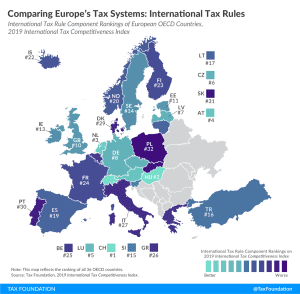
All Related Articles


Can GILTI and the GloBE be Harmonized in a Biden Administration?
While there are several parts of the policy that are subject to further discussion and agreement, GloBE is expected to be different from GILTI in several ways.

Personnel Is Policy: Biden International Tax Team Edition
This week, the Treasury Department added several new appointees as staffing continues following President Biden’s inauguration. Among them were three scholars of international tax policy: economist Kimberly Clausing and law professors Rebecca Kysar and Itai Grinberg. These three will be influential in developing the administration’s approach to changing U.S. tax rules for multinational corporations and negotiating international tax policy changes at the Organisation for Economic Co-operation and Development (OECD).
4 min read
Day 2 of OECD Consultation on International Tax Reform Blueprints
The OECD consultation is in the context of the Inclusive Framework on Base Erosion and Profit Shifting which is made up of delegates from more than 135 countries and is focused on policies that reduce opportunities for tax avoidance by multinational companies. The current proposals being considered would change both where and how much companies pay in corporate taxes.
4 min read
Day 1 of OECD Consultation on International Tax Reform Blueprints
The first session was focused on Pillar 1 of the OECD proposal. The pieces in Pillar 1 would change tax rules so that companies would be paying more taxes in countries based on the location of customers. This approach would move more tax revenues into so-called “market countries.”
3 min read
Two Roads Diverge in the OECD’s Impact Assessment
The difference that the OECD presents between the potential impact in the context of agreement compared to a harmful tax and trade war should show policymakers the value of continuing multilateral discussions.
6 min read
Pillars, Blueprints, an Impact Assessment, and Construction Delays
The OECD released blueprints for proposals on changing international tax rules alongside an impact assessment based on the overall design of the proposals. While the blueprints cover proposals both for changing where large multinationals owe corporate tax and designing a global minimum tax, there are still many unanswered questions. In the meantime, other digital tax proposals are moving forward and have the potential to result in a harmful tax and trade war.
4 min read
Designing a Global Minimum Tax with Full Expensing
The design and implementation of a global minimum tax is not simple and straightforward. There are dozens of challenging issues that policymakers will need to consider. So, when it comes to the way the minimum tax treats new investment, it seems clear that incorporating full expensing into the design would have significant benefits.
6 min read

Digital Tax Deadlock: Where Do We Go from Here?
We recently hosted an exclusive webinar discussion to get up to speed on recent digital tax developments and gain insight from leading international tax experts on the OECD’s BEPS project.
9 min read

Watch: Taxing the Digital Economy
What changed in the global economy that disrupted traditional means of taxation? Is it worth finding a way to include tax digital goods and services in the tax base? Why are digital services taxes so problematic? Are there better options—ways to adapt our current system without introducing complex and economically harmful policies?
2 min read
The U.S. Trade Representative Expands Its Digital Services Tax Investigations
The U.S. Trade Representative (USTR) expanded its digital service tax investigations, announcing Section 301 investigations into digital tax policies in nine countries and the European Union. The announcement follows an investigation of the French digital services tax that was completed in 2019, after which the USTR threatened significant #tariffs in retaliation against France.
5 min read
Digital Services Taxes: Do They Comply with International Tax, Trade, and EU Law?
A digital services tax like the one implemented by France likely violates both the General Agreement on Trade in Services and a model U.S. free trade agreement. However, it is uncertain whether meaningful relief could be obtained under either regime.
26 min read
Chaos to the Left of Me. Chaos to the Right of me.
The OECD recently announced that the negotiation timeline for new digital tax proposals has now been pushed back to October due to the COVID-19 pandemic, although the end-of-year deadline for the overall project is still in place.
5 min read
Profit Shifting: Evaluating the Evidence and Policies to Address It
The OECD has been working to assess the impact of their program of work, and it will be critical for this assessment to take into account impacts not only on revenues, but also on growth and investment.
7 min read

The ABCs of the OECD Secretariat’s Unified Approach on Pillar 1
If there is double taxation due to digital services taxes or because a country is unwilling to conform to the structure of the Secretariat’s proposal, the impact would be a net negative for many businesses.
8 min read
Next Steps from the OECD on BEPS 2.0
The continuation of this work is important, but the OECD and policymakers around the world should carefully consider whether these proposals will lead to more certainty, or if they will undermine that goal by simply be a step toward more unilateralism. The impact on cross-border investment will also be a critical issue to consider, and the ongoing impact assessment by the OECD is an important part of the work.
6 min read
OECD Tackling Harmful Tax Practices
Countries around the world often design their tax policies to become attractive targets for foreign investment. These policies can be anything from a system with special preferences for certain industries to a well-designed tax system based on principles of sound tax policy. Systems that are rife with special preferences and complexities can create distortions in local jurisdictions and across the global economy.
3 min read